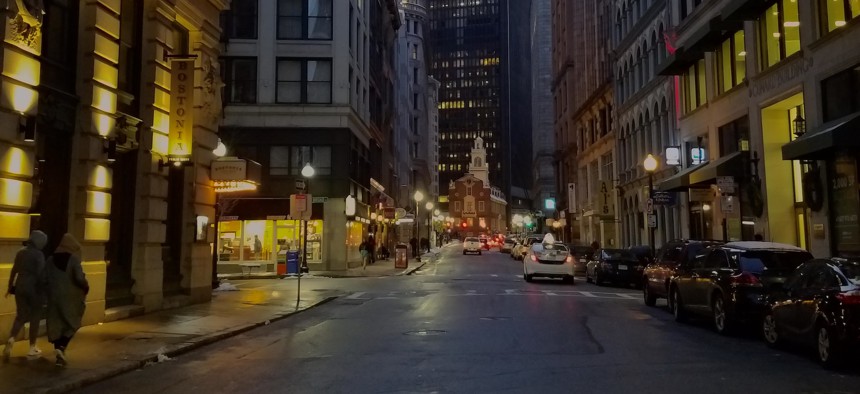Connecting state and local government leaders
A repeat of the 1755 Cape Ann quake could devastate one of the nation’s oldest cities. But the costs of strengthening vulnerable buildings and infrastructure may not be worth it.
BOSTON — Walking into the Government Center station from City Hall Plaza, a spacious 40-foot glass and steel headhouse greets commuters heading down to catch Blue and Green line trains that serve the transit complex below. Although the station originally opened in 1898 when Boston built the nation’s first subway line, the headhouse is a relatively new addition, opening in March 2016 after the station complex underwent major renovations.
The headhouse is a fairly simple design, but one that features giant steel crossbracing that’s visible from the street and from the escalators heading down to the station platform.

That “X” shape isn’t necessarily a common feature in older East Coast cities, but in earthquake-vulnerable places on the West Coast, similar crossbracing is a sign of structural stability, not just in newer buildings built to current seismic code but also in older buildings that have been retrofitted. If a major earthquake strikes, buildings with crossbracing—and the people inside—will have a better chance at surviving intense shaking.
While New England’s largest city doesn’t face the same kinds of seismic risks that the West Coast does, Boston can’t necessarily breathe easy. New England has experienced moderate earthquakes previously and Boston, in particular, could be devastated not just due to the age of its buildings, but also because of the ground much of the city is built on.
When Boston was founded in 1630, the city was built on a peninsula connected to the mainland by narrow strip of land. Over time, Bostonians filled in the adjacent tidal flats and swamps with landfill, changing the shape of the waterfront and the city. Boston grew by creating new land, including the Back Bay neighborhood, which was built atop tidal flats that were gradually filled in during the second half of the 19th century.
But that landfill consists of soft soils, material that doesn’t hold together well during major seismic events. In fact, that landfill can amplify shaking, which is what happened in San Francisco’s Marina District during the 1989 Loma Prieta earthquake and in Seattle’s SoDo and Pioneer Square neighborhoods in the 2001 Nisqually quake.
On Nov. 18, 1755, a moderate-to-strong earthquake—with an estimated magnitude of 6.0 to 6.3—rocked New England with an epicenter roughly 25 miles off Cape Ann, which itself is about 40 miles northeast of Boston. At the time, Boston was still a small colonial city, but damage was widespread.
According to the Massachusetts Historical Society:
The 1755 earthquake rocked Boston, with the shaking lasting more than a minute. According to contemporary reports, as many as 1500 chimneys were shattered or thrown down in part, the gable ends of about 15 brick buildings were broken out, and some church steeples ended up tilted due to the shaking. Falling chimney bricks created holes in the roofs of some homes. Some streets, particularly those on manmade ground along the water, were so covered with bricks and debris that passage by horse-drawn carriage was impossible.
If the same quake hit today, the damage would be considerably worse due to the age and design of the buildings, the density of the city and the extent Boston has grown atop of ground vulnerable to shaking.

Brick and masonry facades and decorative cornices that extend from parapet walls would crash onto streets and sidewalks. Aging waterpipes and gas lines would rupture. Landfill soils would fail due to liquefaction, destabilizing aging structures built on top of them.
The seismic risk Boston faces is something that’s been known for many years. But the rarity of such a disaster makes planning for such a disaster challenging. In fact, strengthening Boston’s older buildings and retrofitting infrastructure to withstand a repeat of the 1755 quake may not make economic sense compared to cities on the West Coast that experience more frequent quakes.
TuftsNow, a publication from Tufts University, wrote in February 2012:
Extensive studies of the Boston area in the 1970s concluded that the chances are small that we will experience a destructive earthquake during our lifetimes, called a 2,500-year earthquake. Technically, the 2,500-year earthquake is an event that has an approximately 2 percent chance of happening within 50 years. The event itself is obviously not expected to run like clockwork once every 2,500 years. The rarity of such an event implies that while we have a responsibility to protect human life, the return on investment for mitigating property damage would be low.
The risk and return on investment in places like Los Angeles, San Francisco and Seattle is very different due to the frequency and severity of quakes on the West Coast. So while those distinctive X-shaped structural supports may be common features in earthquake country, don’t expect them to become more prevalent on the East Coast.
Michael Grass is Executive Editor of Government Executive’s Route Fifty and is based in Seattle.

NEXT STORY: 8 Ways to Improve Communication In Your Office




